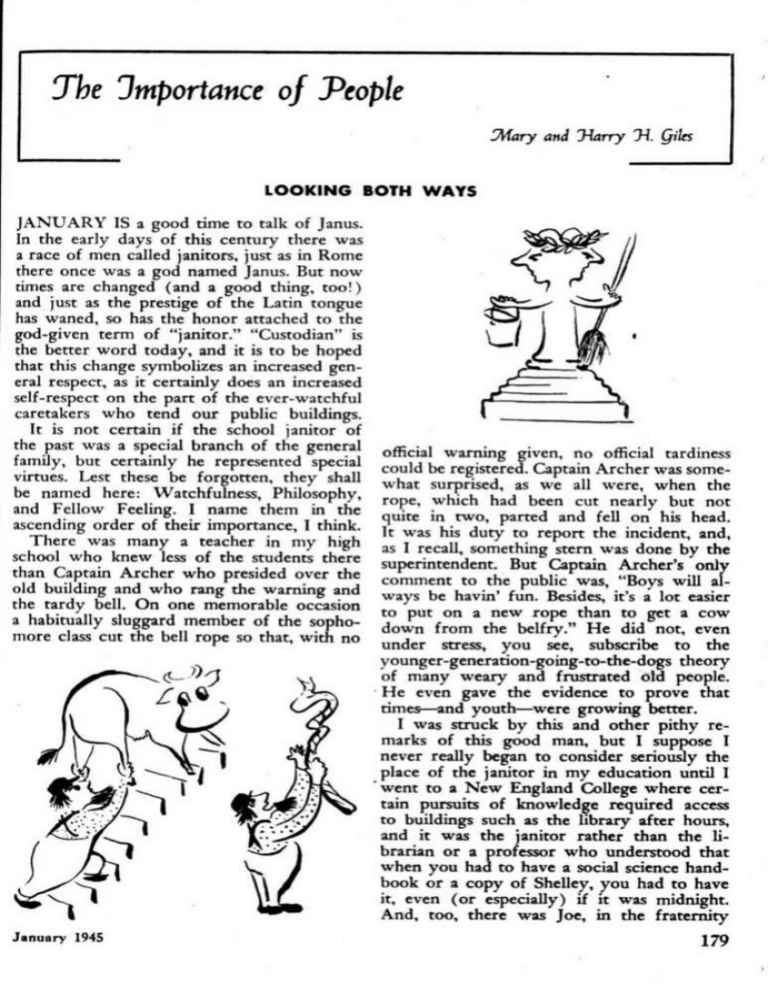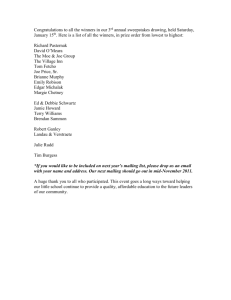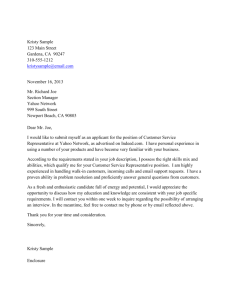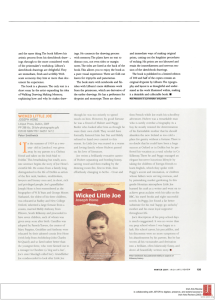
beh Importance of -People
Mary and arry 9H. ileks
LOOKING BOTH WAYS
JANUARY IS a good time to talk of Janus.
In the early days of this century there was
a race of men called janitors, just as in Rome
there once was a god named Janus. But now
times are changed (and a good thing, too!)
and just as the prestige of the Latin tongue
has waned, so has the honor attached to the
god-given term of "janitor." "Custodian" is
the better word today, and it is to be hoped
that this change symbolizes an increased general respect, as it certainly does an increased
self-respect on the part of the ever-watchful
caretakers who tend our public buildings.
It is not certain if the school janitor of
the past was a special branch of the general
family, but certainly he represented special
virtues. Lest these be forgotten, they shall
be named here: Watchfulness, Philosophy,
and Fellow Feeling. I name them in the
ascending order of their importance, I think.
There was many a teacher in my high
school who knew less of the students there
than Captain Archer who presided over the
old building and who rang the warning and
the tardy bell. On one memorable occasion
a habitually sluggard member of the sophomore class cut the bell rope so that, with no
January 1945
official warning given, no official tardiness
could be registered. Captain Archer was somewhat surprised, as we all were, when the
rope, which had been cut nearly but not
quite in two, parted and fell on his head.
It was his duty to report the incident, and,
as I recall, something stern was done by the
superintendent. But Captain Archer's only
comment to the public was, "Boys will always be havin' fun. Besides, it's a lot easier
to put on a new rope than to get a cow
down from the belfry." He did not, even
under stress, you see, subscribe to the
younger-generation-going-to-the-dogs theory
of many weary and frustrated old people.
He even gave the evidence to prove that
times--and youth-were growing better.
I was struck by this and other pithy remarks of this good man, but I suppose I
never really began to consider seriously the
·place of the janitor in my education until I
went to a New England College where certain pursuits of knowledge required access
to buildings such as the library after hours,
and it was the janitor rather than the librarian or a professor who understood that
when you had to have a social science handbook or a copy of Shelley, you had to have
it, even (or especially) if it was midnight.
And, too, there was Joe, in the fraternity
house. Joe was as wise a man as any in that
place-wiser in fact.
It was Joe who first brought home a
fundamental of biological science, involving
the family, romantic idealism and social patterns. One day when Joe was patiently
picking up the card room, retrieving the
debris of lesser, younger, and more careless
men, the house chaplain asked, apropos of
nothing whatever, "Joe, how many children
do you have?"
"Four that I know of," said Joe, and went
on to connect the vacuum cleaners, possibly,
but not certainly, oblivious of the fact that
he had started an endless series of new
speculations about man and woman. It was
a compatriot of Joe's who stopped the angry
attacks on the star tackle of our football team
after we had lost the Big Game. The tackle
was being upbraided for having lost his sleep
through a heavy date the night previous to
the game. Old Doc, though himself an ardent
follower of the team, silenced the bitter accusers and announced, "No, boys. Some
180
women is sweeter than any ball game ever
won or lost."
It is natural, I suppose, that janitors (for
that is the main topic) should turn often and
long to thoughts of love. For, like the poets,
they are watchful. Perhaps they see what is,
more often than those who look for what
should be. It was only after I became a faculty
inmate of educational buildings that I realized
how deeply janitors, along with Vergil
Horace, Freud, Havelock Ellis, and the
Elizabethan poets, were impelled to think
about human motives such as love and honor.
They also think a great deal about authoritarianism.
For example, janitors in a certain university were at one time checked on by an
overseer. This man was tall, thin, and
dyspeptic. He made irregular rounds, hoping
to surprise his underlings in derelections
from duty. Whenever he found anything out
of place or a job undone he seemed to take
pleasure in recording demerits against the
unlucky culprit. This policy of his did more
than any labor organizer to bring into being
a strong janitors' union. But in his days of
"unimpeded snooperiority" as one janitor
called it, he took special pleasure and offense in his visits to one campus building. It
was the laboratory school where a good deal
of experimental work was done. Here there
were continual changes in the janitorial staff.
This example will show why.
The art teacher of the school had made
the studio a place rich in materials of all
kinds and had invited teachers of all subjects
to use her room. It was not uncommon to
find at work there a boy from the mathematics class painting panels for a mural on
the history of measurement; a group of
eighth-graders working on a series of plaques
which showed the plans of medieval, Victorian, and modem cities; some ninth-grade
science students getting ready for a puppet
play on the development of concepts of the
universe; a core class making models for an
exhibit on housing; a group of upper classmen designing sets and costumes for a play;
all these in addition to the regular classes in
painting, sculpture, and art history.
Since these projects involved many materials and considerable time, it was natural
that the room was often full of a great array
of objects in unfinished form, and that the
clean-up problem was usually acute. What
Educational Leadership
happened over and over
again was that the students
left things so that work
could start quickly again
the next day; the janitors
saw the point and did not
disturb them. The inspector reported that things
were in a mess, the janitors were reprimanded
and complained to the
principal, the principal requested the art teacher to
tidy things up, the art
teacher did her best, but
could never get the things satisfactory to all
concerned.
This was an excellent illustration of the
difficulties which can be created by persons
who have different purposes in mind. The
teacher and the janitors could work out a
good mode of operations so long as student
_-I
experience was the main thing to be considered. But when the inspector came in
from outside, his standards (as set up by the
Big Boss, the Superintendent of Buildings
and Grounds)-based on the care of lecture
classrooms, not of individual developmentwere imposed to the general discomfort of all.
Finally, there was the school superintendent
who introduced his speech on "ExtraCurricular Activities as Part of Total Education" by saying, "I have been in this
school system eleven years and have worked
under four janitors." He went on to point
out how many of the things from health to
human relationships-which seem small but
make lasting impressions--are the results of
the human and professional qualities of
January 1945
janitors and other doers of the less-honored
and interesting tasks of our society.
He concluded with a story of the janitor
in the largest high school of the city. This
man was a kindly person when he began
his service. He had remained so through all
the hard work, the slights, and indignities
put upon him by irritable teachers and careless children. And by two things--being
kind, and taking time to talk with people-this good man had become a friend and counselor to hundreds of people, young and old.
But he had never told anyone what to do.
He had listened well, and shown sincere interest. That was his big contribution to education. How much it was needed and valued
was symbolized, said the superintendent, by
a happening of the past June. Somewhat to
the surprise of some parents and teachers, the
senior yearbook had been dedicated to the
janitor of the school. The dedication was in
these words: "To someone we care about
because he cares about us."
181
Copyright © 1945 by the Association for Supervision and Curriculum
Development. All rights reserved.









